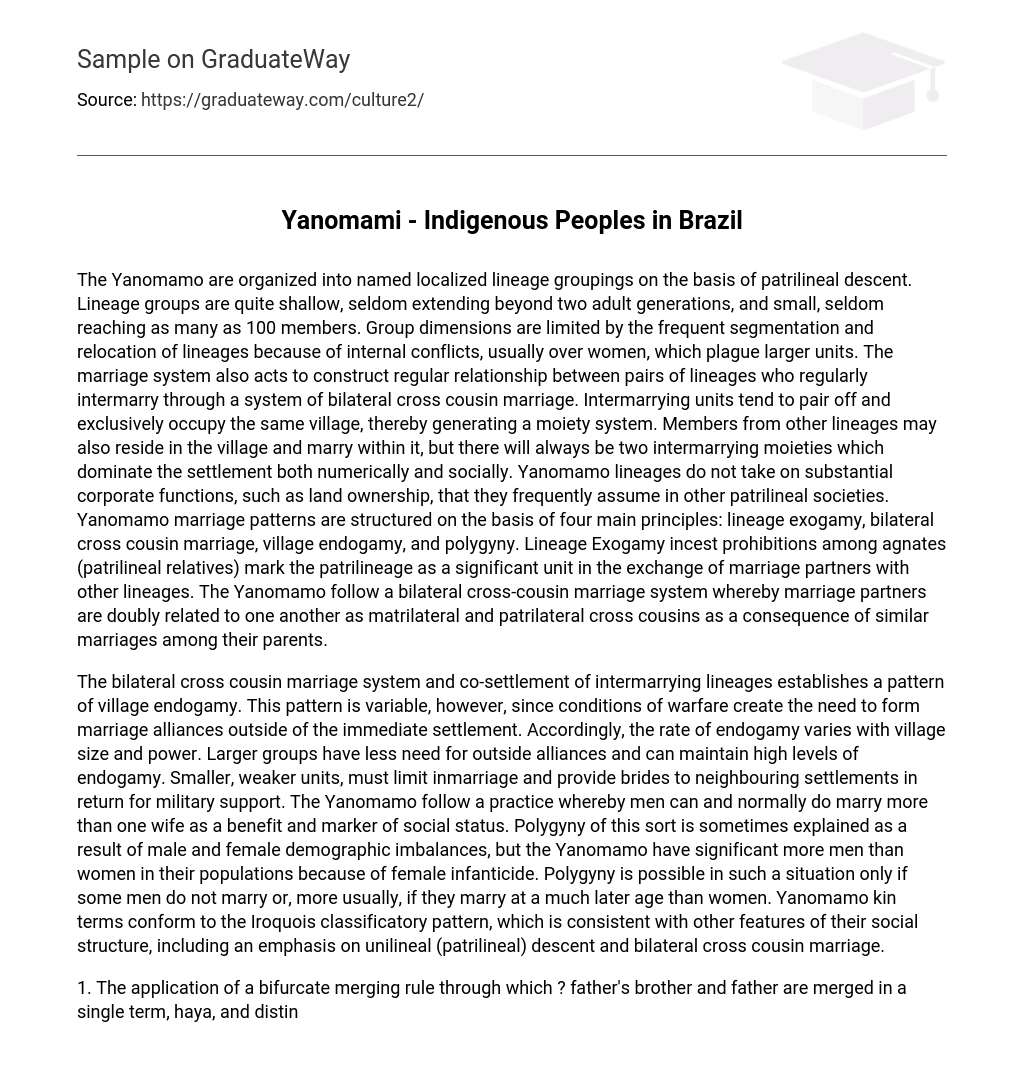The Yanomamo are organized into named localized lineage groups based on patrilineal descent. These lineage groups are shallow and small, usually only spanning two adult generations and having fewer than 100 members. The size of these groups is limited because lineages often separate and move due to conflicts, typically relating to women, that occur within larger units.
The marriage system also serves to create consistent relationships between pairs of lineages who regularly intermarry through bilateral cross cousin marriage. Intermarrying groups typically establish exclusive residence in the same village, resulting in the development of a moiety system. While individuals from other lineages may also live and marry within the village, the settlement is primarily dominated both numerically and socially by two intermarrying moieties.
Yanomamo lineages do not typically take on important roles like owning land, which is common in other patrilineal societies. Yanomamo marriage patterns are based on four main principles: lineage exogamy, bilateral cross cousin marriage, village endogamy, and polygyny.
Among the Yanomamo people, the prohibition of incest and exogamy within the patrilineal relatives establishes the importance of the patrilineage in exchanging marriage partners. The Yanomamo have a bilateral cross-cousin marriage system, which results in marriage partners being related to each other as both matrilateral and patrilateral cross cousins due to similar marriages in their parents’ generation.
The practice of marrying cross cousins and living together in the same settlement creates a pattern of marrying within the village. However, this pattern can change depending on the presence of warfare, as alliances with outside settlements become necessary. As a result, the level of marrying within the village can differ based on the size and strength of the community. Larger groups have less need for outside alliances and can continue to marry within the village at high rates. On the other hand, smaller and weaker groups must restrict intra-village marriages and instead offer brides to neighboring settlements in exchange for military aid.
The Yanomamo people engage in polygyny, whereby men are permitted and commonly marry multiple wives to elevate their social standing. This custom is believed to be a result of the unequal ratio between males and females within their society, which is largely influenced by female infanticide.
Polygyny can happen when some men opt not to get married or when men marry later than women. The Yanomamo kin terms adhere to the Iroquois classificatory pattern, which corresponds with their social structure that highlights patrilineal descent and bilateral cross cousin marriage.
The text describes the application of a bifurcate merging rule. This rule merges the terms “father’s brother” and “father” into a single term, haya, while distinguishing them from “mother’s brother” which is called soaya. In addition, the rule merges “mother’s sister” with “mother” and distinguishes it from “father’s sister” called yesiya.
The classification of parallel cousins and siblings as eiwa (male) and amiwa (female), along with specific terms for cross cousins as soriwa (male) and suaboya (female), implies the merging of these relatives. This pattern, seen in various Iroquois terminologies, is associated with a unilineal descent system, highlighting the significance of distinguishing between the father’s and mother’s sides of the family for social interactions.
The difference between various types of cousins reflects the separation of descent lines. Additionally, it signifies another significant distinction: parallel cousins, similar to siblings, are not allowed to marry, while cross cousins can be chosen as preferred marriage partners in a cross cousin marriage system.





